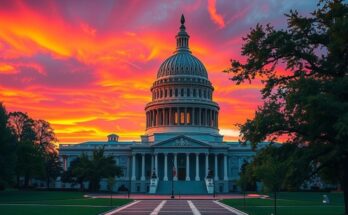Ecuador’s President Daniel Noboa alleged irregularities in the first round of voting, claiming armed groups influenced voter choices. The OAS and EU observation missions refuted his claims, affirming the elections were fair. González echoed doubts about the electoral process, amid rising concerns of declining democratic norms in Ecuador and the impact of violence on the electorate.
Ecuador’s President Daniel Noboa has raised allegations of irregularities related to the first round of the country’s presidential election. Despite claiming he garnered a slim lead, Noboa stated in a live interview that there were voting inconsistencies and even suggested that armed groups pressured voters to support his opponent, Luisa González. “There have been many irregularities,” Noboa asserted, challenging the official results.
In response to these claims, the Organization of American States (OAS) Electoral Observation Mission stated that their findings aligned with the official results provided by Ecuador’s National Electoral Council (CNE). The OAS emphasized that they had detected no widespread irregularities that could potentially alter the election outcomes, thereby supporting the integrity of the electoral process.
Both candidates expressed concerns about the election’s validity, with González voicing her distrust of the CNE, claiming there were inconsistencies without providing supporting evidence. Meanwhile, the European Union’s election observation mission characterized the election as fair and transparent, rejecting allegations of electoral fraud as disinformation.
The discussion surrounding claims of electoral fraud comes amidst growing concerns of deteriorating democratic norms in Ecuador, as noted by security analyst Jean Paul Pinto. Pinto commented on Noboa’s governance approach, indicating a pattern of ruling by decree rather than through democratic processes, particularly in his efforts to address escalating crime through military intervention.
Additionally, Pinto highlighted the context of rampant crime as significantly influencing voter behavior in the elections. Notably, in regions where the president performed poorly, González secured a higher percentage of votes, demonstrating a clear dissent toward Noboa’s leadership. Pinto concluded that Noboa’s statements about armed groups reinforcing opposition votes could have dangerous implications for perceptions of sovereignty within Ecuador.
In summary, President Daniel Noboa’s allegations of electoral irregularities are contested by both election monitors and his opponent. The claims appear to reflect a broader issue of political trust amidst rising concerns about Ecuador’s democratic integrity and governance. Furthermore, the context of violence and voter sentiment is crucial to understanding the electorate’s choices in these turbulent times.
Original Source: edition.cnn.com




